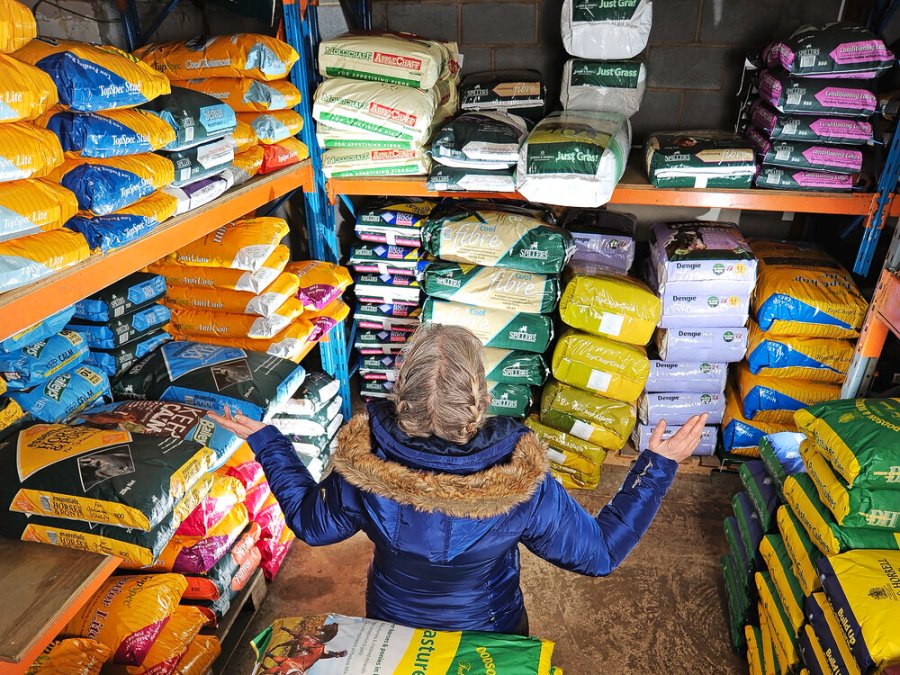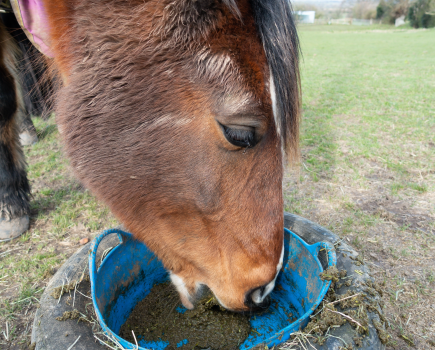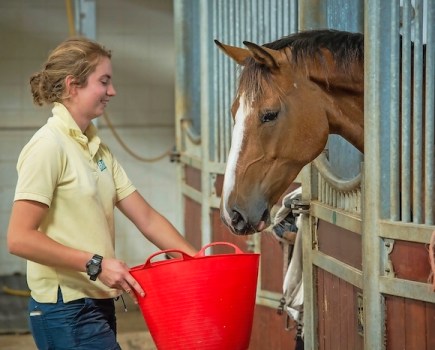Does your horse actually need to be given hard feed? Providing a fully balanced diet that gives all the nutrients they require is an important part of owning and/or riding a horse. But with so many different brands and types of hard feed on the market, it can be difficult to decide what to feed your horse and, crucially, how much of it they need to eat.
When you factor in that a growing number of horses around the world are classed as obese, which is a major health risk, threat to life and all-round welfare concern, do horses even need to be given hard feed at all? Your Horse asked several equine nutritionists for the lowdown on what — and how much — hard feed really needs to be in a horse’s bucket.
“Studies suggest that weight gain more than doubles the risk of horses and ponies developing laminitis,” notes Clare Barfoot, marketing and research and development director at Spillers. “Excess weight can also have other negative consequences, from increasing the risk of insulin dysfunction to poor performance. Therefore, the last thing an overweight horse needs is additional calories. In simple terms, an overweight horse is receiving excess calories, so rather than them being burned during exercise, they are instead stored as fat.”
What every horse does need is a balanced diet that is correctly matched to their level of exercise, so that calories in their hard feed are being burned off when they work.
“Grazing and forage alone can far exceed the energy requirements of many horses and ponies at rest, or even those in light to moderate work. This is part of the reason why we are seeing an obesity epidemic,” says Dengie nutritionist Tracey Hammond. “However, a forage-only diet isn’t usually fully balanced, and all horses require a balanced diet — this is the bit that horse owners find tricky to get right.”
How to calculate what hard feed your horse needs
Every horse is an individual, and simply looking on the feed bag to work out what your horse needs may not be an effective way of rationing his feed, particularly if they need to lose a few pounds. However, if you are not feeding the recommended levels as stated on the feedbag, this is when your horse is likely to benefit from having a balancer or supplement added to their bucket feed. Speak to a nutritionist for advice with this.
“If your horse is free from laminitis, some grass access is beneficial as it encourages movement and social interaction,” says Tracey Hammond. “It may still be necessary to limit the amount of grass consumed and there are various ways to do this, including using a grazing muzzle, or confining your horse to a smaller area by strip grazing. In some cases, complete removal from grazing is advised in order to encourage weight loss and manage laminitis risk.”
Hay — preferably late-cut hay that is low energy and feels coarse or stalky — then becomes the mainstay of your horse’s diet. “To encourage weight loss, hay intake should be restricted to 1.5% of the horse’s bodyweight on a dry matter basis daily,” advises Tracey.
Assuming the hay is around 90% dry matter, the amount to feed a 500kg horse is calculated as follows:
- To calculate dry matter intake: 500 x (1.5/100) = 7.5kg of dry matter required daily.
- To calculate how much hay to feed: 7.5 ÷ (90/100) = 8.3kg of hay fed daily.
If you are still unsure about how much to feed, speak to your vet or nutritionist.
Know what hard feed you’re giving
If you already give a bucket feed to your horse, it would be worth assessing its nutrients and the amount you’re feeding to ensure that your horse is getting everything they need in their diet. “Remember that the bucket feed doesn’t need to be over-complicated and adding ‘a bit of this and a bit of that’ isn’t usually necessary,” says Katie Grimwood, nutrition advisor at Baileys.
“First, look at the main fortified feed — for example, whether it’s a mix or cube. Are you feeding the recommended amount for your horse’s size and workload? If so, you shouldn’t need to add any extra balancers or broad-spectrum supplements as their requirements should be being met. Check with the manufacturer if you’re unsure.
“If not, increasing the amount fed might provide too many calories, which is the same thing as too much energy, in which case you may need to either change onto a lower calorie/energy feed, continues Katie. “Or you could top up the horse’s diet with a balancer to help make sure that nutrient requirements are being met without giving too many calories.”
A chaff and/or beet isn’t always essential, especially for horses who are getting plenty of forage. However, they can be useful to increase chew time and slow down horses who tend to rush their bucket feed. “They can also be useful to disguise medication or to add extra fibre-based calories for those who need them,” says Katie.
“Remember that forage should always form the main part of the diet as this supports the working of the digestive system. If your horse is overweight, consider ways that you can reduce the calorie content of his bucket feed first, and then look at the forage.”
![]() Have you heard about Your Horse’s #FitNotFat campaign? Equine obesity is an enormous welfare problem and we’re on a mission to provide owners and riders with the knowledge, skills and information you need to keep your horse in tip-top health. It could be life saving!
Have you heard about Your Horse’s #FitNotFat campaign? Equine obesity is an enormous welfare problem and we’re on a mission to provide owners and riders with the knowledge, skills and information you need to keep your horse in tip-top health. It could be life saving!
Related content









